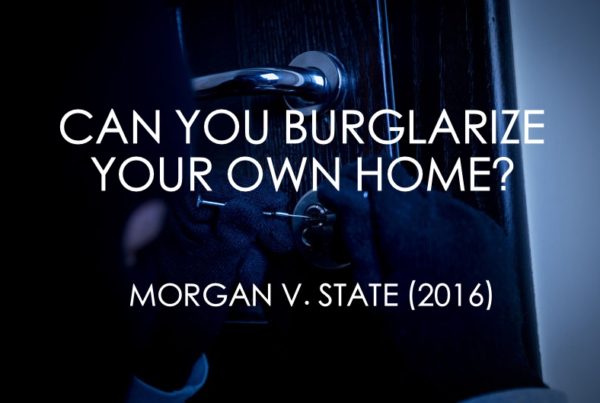 Here’s the scenario – man is caught entering a home through a window that he broke. A female occupant of the home comes face-to-face with him and he then runs away. Is there evidence that the man was attempting to unlawfully enter the woman’s home? Certainly. Is there evidence to support the notion that he intended to commit a theft (or other felony) therein? That’s the question.
Here’s the scenario – man is caught entering a home through a window that he broke. A female occupant of the home comes face-to-face with him and he then runs away. Is there evidence that the man was attempting to unlawfully enter the woman’s home? Certainly. Is there evidence to support the notion that he intended to commit a theft (or other felony) therein? That’s the question.
In Gear v. State, when posed with this question, the 12th District Court of Appeals (Tyler) held that the evidence was insufficient to prove that the man intended to commit a theft or other felony on the premises. Yes, the man tried to break in and yes the man was poor, but the State simply did not prove that an attempted “burglary” had occurred.
Enter the CCA (and exit the burden of proof). The Texas Court of Criminal Appeals reversed the Court of Appeals, holding:
On this record, we decide that a factfinder could reasonably find beyond a reasonable doubt that the recently unemployed appellant with about one dollar in his pocket intended to commit theft inside the complainant’s home when he attempted to enter the home through the window that he had just broken and where the evidence also shows that appellant ran when interrupted by the complainant and that appellant gave conflicting and implausible explanations for his actions.
If you ask me, who cares what explanations appellant gave for his actions? The State must prove this specific intent crime. The burden doesn’t shift to appellant to prove his innocence. If the State doesn’t prove the specific intent to commit theft, a verdict of acquittal is required.
Judge Cochran dissented from the majority. She writes,
[The majority opinion] seems to me to be a “Don’cha know” standard; appellant broke the window and was about to climb inside, therefore “don’cha know” he intended to commit theft…Looking at all of the evidence in this case, even in the light most favorable to the trial judge’s verdict, I cannot find the evidence sufficient in quality, character, or weight…
While everyone can probably agree that the man intentions were not honorable, if the State is going to charge something, the State must prove up the charge.










